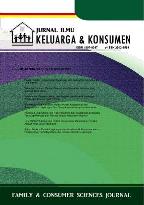PENGARUH LINGKUNGAN NON FISIK PESANTREN DAN KECERDASAN EMOSIONAL TERHADAP PENYESUAIAN REMAJA (KASUS PESANTREN MODERN)
Abstract
The adaptation ability of children both to the self and to the environment harmonically is important process for every child. Families and schools which are, in this case, is the Islamic boarding school are part of microsystem that has a direct influence on adolescent’s adjustment. This study aimed to analyze the influence of non-physical environment of Islamic boarding school and emotional intelligence on adolescent’s adjustment. The population of this study was the eighth-grade students of Integrated Islamic Junior High School (SMPIT) in Kabupaten Subang. The participants were selected by stratified random sampling and involved 100 students as participants. The results showed the quality of the non-physical environment of Islamic boarding school, emotional intelligence, and adolescent’s adjustment was in the medium category. Family size is negatively correlated with the emotional intelligence of the adolescents. In addition, the family income is positively correlated with increasing of adjustment. Results of regression analysis showed that non-physical environment of Islamic boarding school and emotional intelligence give a positive influence on adolescent’s adjustment. These findings revealed the importance of conducive environment of Islamic boarding school to increase the ability of the pupil’s adjustment.Copyright (c) 2018 Jurnal Ilmu Keluarga & Konsumen

This work is licensed under a Creative Commons Attribution-ShareAlike 4.0 International License.
Authors submitting manuscripts should understand and agree that copyright of manuscripts published are held Jurnal Ilmu Keluarga dan Konsumen. The statement to release the copyright to Jurnal Ilmu Keluarga dan Konsumen is stated in Copyright Release Form. Copyright encompass exclusive rights to reproduce, to distribute, and to sell any part of the journal articles in all form and media. The reproduction of any part of this journal is allowed with a written permission from Jurnal Ilmu Keluarga dan Konsumen.










